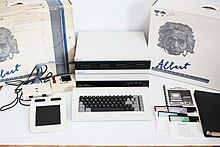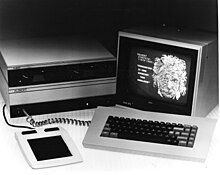Albert (computer)
 Complete Albert computer package | |
| Manufacturer | Albert Computers, Inc. |
|---|---|
| Release date | 1983 |
| CPU | MOS 6502A at 1 MHz |
| Memory | 64 KB DRAM standard, expandable to 192 KB |
The Albert is an Apple II clone, released by Albert Computers, Inc., in 1983. Comparable to the Apple IIe, six models were ultimately produced.
Description
[edit]Albert Computers, Inc. offered a "complete system"[1] for approximately the price of a basic Apple IIe. This included 64k of RAM (192k max), upper and lower case, 256 colors (as opposed to the Apple IIe’s 16 colors), enhanced graphics, Analog RGB support, serial and parallel ports, a graphics digitizer tablet, voice recognition, a software package (including word processor, spreadsheet, data manager, mailing list, word speller), 110/220v AC/DC power, and even an integrated battery backup (option).
The Albert had an unusual "two-piece design" which the company termed "stereo" styling.
History
[edit]
Albert Computers, Inc. was based in Thousand Oaks, California, and modeled its line of Apple clones on the Apple IIe, aiming at home and business consumers.
The company, which insisted that the Albert was not an Apple clone but rather an improvement, saying, "It’s a next-generation computer with more than a dozen advanced hardware features and software capabilities."
The base model of the Albert was $1,595 while the Apple IIe base price was $1,395 and over $3,000 with the options that came standard with the Albert.
The Albert had marketing which featured an image of Albert Einstein and copy which read: "When you're ready to buy a personal computer, it's easy to see why Albert is smarter than Apple." However, Albert Computers, Inc. quickly ran afoul of Apple Computer, Inc., which sued for copyright infringement.
Models
[edit]| Model | Release Date | CPU | Video | Price |
|---|---|---|---|---|
| Albert | 1983 | 6502 | 16 colors | $1,595 |
| Express | 1983 | 6502 and Z80 | 256 colors | $695 |
| Executive | 1983 | 6502 and Z80 | 256 colors | - |
| Professional Executive | 1983 | 6502, Z80, 8088 | 256 colors | - |
| Pup | 1983 | 6502 (Z80 coprocessor optional) | 256 colors | $499 |
| Profex Portable | 1984 (?) | 6502, Z80, 8088 | 256 colors | - |
Specifications
[edit]Video display
[edit]- Display modes
- 40-column text, 5x7 dot matrix
- 80-column text, 5x7 dot matrix, monitor (optional with 128 KB RAM expansion)
- Low-resolution color graphics
- High-resolution color graphics
- RGB and composite monitor outputs
- Text capacity
- 24 lines by 40 columns
- 24 lines by 80 columns (optional with 128 KB RAM expansion)
- Character set
- 96 printable ASCII characters, upper- and lowercase
- Character formatting
- Normal
- Inverse
- Flashing
- Low-resolution graphics
- 6 on-screen colors (from 256 selectable colors)
- 48 H × 48 V resolution[clarification needed]
- 48 H × 40 V with 4 lines of text
- High-resolution graphics
- 6 on-screen colors (from 256 selectable colors)
- Color-selectable text and background
- 280 × 192 px resolution (6 colors)
- 140 × 192 px resolution (16 colors)
Processing
[edit]- Accumulator (A)
- Index registers (X, Y)
- Stack pointers (P)
- Register size
- 8-bits
- 8-bits
- 16-bits
- Address range
- 65,536 (64K)
Memory
[edit]- Standard memory
- 64 KB of dynamic RAM
- Expandable on motherboard to 192 KB
- Programmable storage
- 64 KB RAM
- Read-only memory
- 2 on-board ROM sockets
I/O
[edit]- Detached typewriter-style keyboard
- Microphone input
- 8-ohm speaker
- Output speaker jack
- Amplifier with volume control
- Video display output (composite color or programmable RGB)
- RS-232 serial port
- Parallel printer port
- Serial printer port
- RS-432/422 (links to Ethernet via network gateway connector)
- 5 expansion slots (fully buffered with interrupt and DMA priority structure)
- Hand control (gaming) I/O signals (16-pin DIP)
- Annunciator outputs: 4
- Strobe: 1
- Switch inputs: 3
- Analog inputs: 4
- Ground and +5 V
- Soft-switched
- Analog-to-digital converter inputs
- Analog inputs: 6 (8)
- Annunciator outputs: 4
- Switch inputs: 3
- Ground and +5 V
- Soft-switched
- Digital-to-analog converter outputs
- 8-bit digital/analog converter
- Real-time clock: month, day, hour, minutes, second
Power requirements
[edit]- Line
- 110 to 220 VAC ~, or 8 to 32 VDC
- Battery
- 12 VDC
- 1.2 ampere-hours
(All specifications standard except as indicated.)
References
[edit]- ^ "Albert Computer Brochure" (PDF). Classic Tech.
Further reading
[edit]- Computerworld (July 11, 1983) "Apple-Compatible System Runs Over 15,000 Packages"
- PC Magazine (April 11, 1989) "Dvorak's Hall of Infamy": The Order of the White Elephant ("Products that were ill-timed or flawed, but somewhat interesting.")
External links
[edit]- Albert Apple II Clone (Time Tech Traveller YouTube channel, June 11, 2022)
- Photo Gallery (VintageComputer.ca)
- Apple2Clones.com
